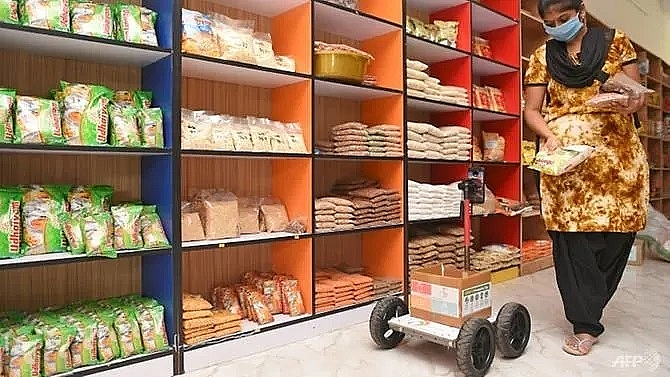Robot shopper helps Indian engineer maintain social distancing amid COVID-19
 |
| Karthik Velayutham tells the shopkeeper what items he wants to buy via a video call on a smartphone attached to the robot. (Photo: AFP/STR) |
The humble machine - a cardboard box resting on a four-wheel wooden platform - took the computer engineer two days to make and cost 3,000 rupees (US$40).
But it is performing a crucial job for its creator at a time when social interactions carry the risk of catching a virus that has infected more than four million people and killed over 297,000 worldwide.
"I ran my robot to the wine shop as a trial to demonstrate how someone can use it in a crowded place and to create awareness about the importance of social distancing to prevent the spread of coronavirus," Velayutham, 31, told AFP.
"I have tested this device on the streets and it has no problems and goes smoothly, even over speed bumps because I have used a gear motor."
Velayutham controls the machine from the comfort - and safety - of his home in Coimbatore, a major city in southern Tamil Nadu state. Using the robot's built-in smartphone, he can send it commands via the internet.
He tells the shopkeeper what he wants to buy via a video call. The machine can carry loads of up to 50 kilogrammes (£110).
"The speciality of my robot is that it can be controlled from anywhere in the world," Velayutham said.
"The payment can be done using any mobile wallet or electronic payment system remotely."
Around the world robots have been deployed during the pandemic to deliver food, conduct health checks and even disinfect places.
Velayutham is confident his machine, with a bit of tinkering, can join them on the front lines.
"It can be used in hospitals to interact with patients remotely," he said.
"It can be used in unlimited ways - for shopping, for police patrolling or even in situations like a fire where it's dangerous for people to go."
What the stars mean:
★ Poor ★ ★ Promising ★★★ Good ★★★★ Very good ★★★★★ Exceptional
 Tag:
Tag:
Related Contents
Latest News
More News
- Russian President congratulates Vietnamese Party leader during phone talks (January 25, 2026 | 09:58)
- Worldwide congratulations underscore confidence in Vietnam’s 14th Party Congress (January 23, 2026 | 09:02)
- Political parties, organisations, int’l friends send congratulations to 14th National Party Congress (January 22, 2026 | 09:33)
- 14th National Party Congress: Japanese media highlight Vietnam’s growth targets (January 21, 2026 | 09:46)
- 14th National Party Congress: Driving force for Vietnam to continue renewal, innovation, breakthroughs (January 21, 2026 | 09:42)
- Vietnam remains spiritual support for progressive forces: Colombian party leader (January 21, 2026 | 08:00)
- Int'l media provides large coverage of 14th National Party Congress's first working day (January 20, 2026 | 09:09)
- Vietnamese firms win top honours at ASEAN Digital Awards (January 16, 2026 | 16:45)
- ASEAN Digital Ministers' Meeting opens in Hanoi (January 15, 2026 | 15:33)
- ASEAN economies move up the global chip value chain (December 09, 2025 | 13:32)






















 Mobile Version
Mobile Version